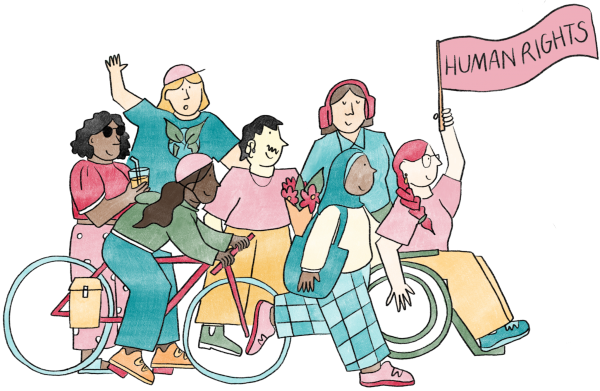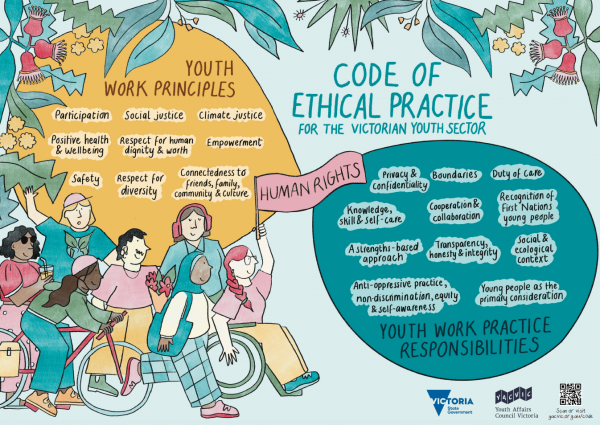On this page
- The Code of Ethical Practice for the Victorian Youth Sector
- Code of Ethical Practice Colouring Page
- Summary
- Human Rights
- Youth work principles
- Youth work practice responsibilities
- What revisions have been made in the 2025 version of the Code?
- Who helped update the Code?
- Code training and professional development
The Code of Ethical Practice for the Victorian Youth Sector
If you work with young people (12-25 year olds), you will often face ethical dilemmas: situations where you have to decide the right thing to do. The Code of Ethical Practice for the Victorian Youth Sector (the Code) is a framework to help you think through those dilemmas. It won’t tell you exactly what to do, because each situation is different. But it will help you work out why you think something is right or wrong, and what you ought to do.

The Code is based on human rights: things that all Victorians—including young people—can expect to enjoy, such as your right to freedom of expression or right to take part in public life.
The Code was first developed by YACVic in 2007 and was revised and relaunched in 2025. You can find more about the history of the Code below.
The Code includes a set of youth work principles and practice responsibilities. It supports, but does not replace your legal responsibilities. Any person, group or organisation that works with young people can choose to use the Code.
Download the Code (Word Document - accessible version)
Download and print the A3 Code poster for your youth space
Download the Code of Ethical Practice Summary
Order copies of the Code
If you're a YACVic member, you can order up to three printed copies of the full Code booklet to be mailed to you by emailing info@YACVic.org.au. If you’d like up to five copies, or you are not a member, you can either collect them from the YACVic office or send us a large (minimum size 25cm x 35cm) self-addressed, pre-paid envelope.
All organisational training bookings will receive a free document and poster.
Code of Ethical Practice Colouring Page
Designed by Angharad Neal-Williams "The design features different people from a range of abilities, backgrounds and interests that were illustrated for the Code of Ethical Practice poster design. The characters have been fleshed out and a few more have been developed to create a page where young people will hopefully see themselves in one of the characters whether it be through their interest, outfit, appearance or activity they're engaging in. Each of the people are representing different components of the code of ethical practice. Some of the components represented in the illustration include climate justice, diversity, positive health and wellbeing, empowerment, knowledge skill and selfcare and social and ecological context."
Summary
This Code is a living document developed with and for the Victorian youth sector. It outlines a framework of principles and practice responsibilities that guide youth work. The Code aims to support the safety, wellbeing and rights of young people. It also promotes the professionalism and credibility of the sector.
Youth work puts young people and their interests first. Youth workers work alongside young people, with goals set by young people themselves. It is not about ‘treating’ or ‘curing’ using clinical methods.
The Code is voluntary but applies to all qualified youth workers. Youth Affairs Council Victoria encourages everyone who works with young people to adopt the Code for ethical decision making.
Different laws apply according to a young person’s age. In the Code, the term ‘young people’ refers to those aged between 12 and 25 years.
Human Rights
Upholding the human rights of young people is at the centre of the Code. This means protecting young people from discrimination of any kind and always putting their best interests first. The Code includes expectations that set apart the role of youth workers from others who work with young people.
Youth work principles
The Code’s principles reflect values that inform youth work. In adopting the Code, youth workers will respect the following principles.
Empowerment
The Code acknowledges that young people under the age of 18 lack power because of their age. The Code advocates for and promotes the voices, experiences and agency of young people. It supports young people to achieve their rights and best interests.
Participation
The Code promotes opportunities for young people to take part in decisions that affect them.
Social justice
The Code highlights the role of youth workers as social justice educators and advocates. It prioritises young people’s human rights, equity, participation, diversity and justice.
Climate justice
The Code promotes care for and connection with the environment that youth workers and young people live and work in. This includes waterways, air, land and ecosystems.
Respect for human dignity and worth
The Code advocates respect for young people’s dignity and worth and their right to make their own choices.
Respect for diversity
The Code respects the intersecting identities, cultures, abilities and backgrounds of young people.
Connectedness to friends, family, community and culture
The Code highlights the importance of social and cultural connection for young people. This helps build their sense of belonging, identity, independence and wellbeing.
Positive health and wellbeing
The Code highlights the importance of supporting young people’s abilities to thrive. It does this through caring for their physical, mental, emotional, social, intellectual and spiritual wellbeing.
Safety
The Code prioritises creating environments that are physically, psychologically and culturally safe. Cultural safety is particularly important for young people with specific religious and spiritual connections and beliefs.
Youth work practice responsibilities
Young people as the primary consideration
Youth workers consider other people and stakeholders. However, a youth worker’s primary responsibility is to young people.
Recognition of First Nations young people
Youth workers are respectful of First Nations cultures, histories and perspectives. Connection to culture and land is important for self-esteem, identity and wellbeing. Youth workers support access to cultural programs for First Nations young people.
Duty of care
Youth workers avoid exposing young people to physical, psychological, emotional or cultural harm. They do this while encouraging young people to take part in activities that challenge them. Youth workers must make sure activities, referrals and programs are safe for all young people. They must protect young people against abuse.
Privacy and confidentiality
Youth workers avoid unnecessary invasions of privacy when collecting information about a young person. They also protect confidentiality. Youth workers ensure young people understand their rights in giving and withdrawing consent.
Boundaries
Youth workers recognise the power imbalance built into the professional relationship. As such, youth workers must respect professional boundaries. These boundaries protect both the young person and the worker.
Transparency, honesty and integrity
Youth workers are clear about what they can offer from the start. Youth workers are transparent about confidentiality, disclosure and safety. They ensure young people understand which agency the youth worker represents and what the agency can provide.
Social and ecological context
Youth work extends to the social context in which the young person lives. Youth workers recognise the impacts of climate change on young people. They understand how overlapping identities and experiences can exclude young people.
Anti-oppressive practice: non-discrimination, equity and self-awareness
Youth workers encourage young people to respect and celebrate all cultural backgrounds, identities and choices. This includes their own. Youth workers advocate against and try to change unjust policies and practices affecting young people.
Cooperation and collaboration
With the young person’s consent, youth workers collaborate with others towards the best outcomes for young people. This includes working with the young person’s family, guardians and carers. Youth workers look for opportunities to work with professionals from other agencies and sectors to benefit young people.
Knowledge, skill and self-care
Youth workers keep up to date with changes to the law and the information, knowledge and practices needed to meet their responsibilities to young people. Youth workers prioritise self-care to help ensure a long career.
A strengths-based approach
Youth workers value young people’s knowledge and life experiences. They highlight strengths that young people may not yet be aware of and support opportunities to develop and build on those strengths.
What revisions have been made in the 2025 version of the Code?
The outcomes of the 2023-24 consultation process led to a focus on the following topics across the revision of the Code and YERP:
- Guidelines and support for young youth workers;
- Cultural safety for multicultural young people and Aboriginal and Torres Strait Islander young people;
- Clarification and guidelines on how to manage boundaries with young people, specifically in online settings, rural areas, when sharing lived experience and for young youth workers;
- How workers and young people can share lived experience safely;
- Self-care and wellbeing in the workplace;
- How to navigate young people’s privacy and confidentiality, especially related to parental consent;
- The inclusion of access needs, accessibility and the Social Model of Disability.
As a result, YERP has been updated in a way that builds around the new Code and offers articles that focus on different aspects of working with young people and so should be used as a companion to the Code’s framework.
Who helped update the Code?
Throughout 2023 and 2024 our young co-designers contributed to the design, focus and content of the newly upgraded Code. A big thank you to Anjali, Emily, Jacob, Jess, Kano, Lauri, Matthew, Mila, Pra, Vera and Zodie!
Members of the Code Steering Committee and other external contributors:
- Alannah & Madeline Foundation
- Australian Catholic University
- Berry Street
- Brophy
- Commission for Children and Young People
- Foundation for Young Australians
- Good Cycles
- Hepburn Shire Council
- Kids First
- Koorie Youth Council
- La Trobe University
- Office for Youth, DFFH
- Project Rockit
- RMIT University
- Scouts Victoria
- Syn Media
- The Y
- Uniting Vic.Tas
- Victorian Commissioner for LGBTIQ+ Communities
- Victorian Aboriginal Education Association Incorporated
- Victoria University
- Women's Health Goulburn North East
- Women with Disabilities Victoria
- Youth Disability Advocacy Service
- Youthlaw
- Youth Workers Association
- YSAS
Code training and professional development
We run Code training regularly at YACVic HQ and online. Check out our events page for upcoming dates.
Want us to come to you? Complete our online enquiry form and we’ll be in touch soon. Priority is given to YACVic members.
The interactive training sessions include some introductory theory and guidance for using the Code in your practice. There is lots of opportunity for discussion and reflective practice as well as strategies for developing ethical practice in your role/organisation. Find out more about training on our Training and Support page.
Topics we cover:
- Why is a Code of Ethical Practice so important for the youth sector?
- What are ethics anyway?
- Background to the Code
- Youth work principles
- Youth work practice responsibilities
- How do I deal with an ethical dilemma at work?
Contact us
If you wish to chat with us about training or implementing the Code of Ethical Practice in your organisation, please contact us at events@YACVic.org.au




